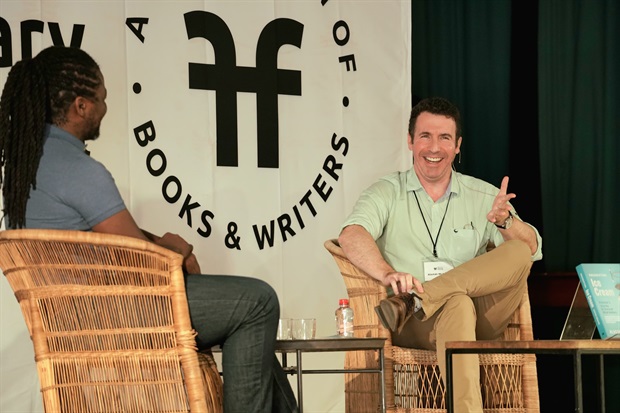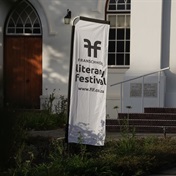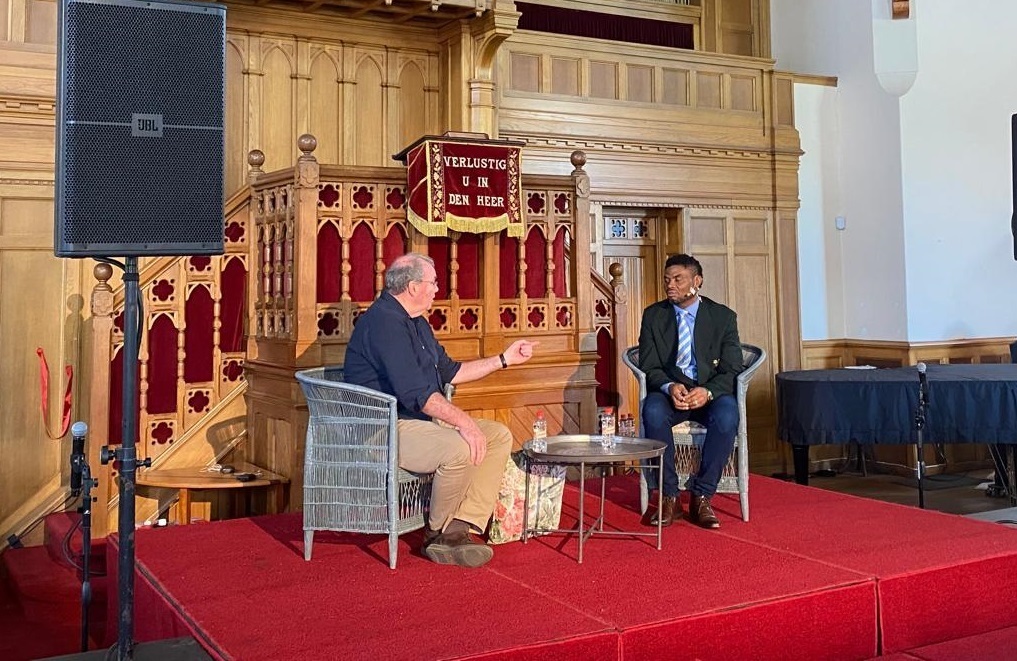
19 May 13:22
19 May 13:13
The streets of Franschhoek have been taken over by its annual literary festival. Attendees come from all over South Africa and other corners of the world for this celebration of literature and reading.
The quaint town is nestled in the Winelands, surrounded by mountains and vineyards. Usually, Franschhoek is quite laid-back, but over the weekend, it has been abuzz with book lovers, authors and industry workers.
19 May 12:58
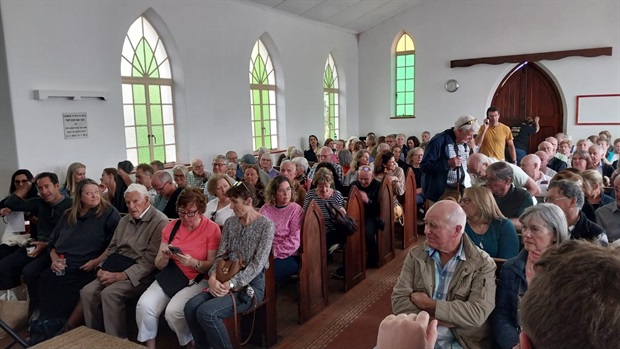
19 May 12:53
Another packed venue – the historic Congregational Church, with a session on Jonathan Ancer's hilarious book, Bullsh!t: 50 Fibs that Made SA, with Pieter du Toit and cartoonist Carlos Amato, about to kick off.
Du Toit wonders: Can we say the title in a church? Bullsh!t was a lot of fun to write, says Ancer."The cons just keep coming," says Ancer.
Amazing how people convince themselves their own lies are true, says Amato. A lot of South African liars are telling themselves a story just to survive. People tell lies that are so obviously lies, says Ancer. Everyone knows they're lying, but they carry on.
He mentions the then police minister on Zuma's "fire pool" as an example – and the famous decuplets of the Pretoria News. The audience is in stitches. We need feel good stories, says Du Toit. People responded to the decuplets story. Amato says he wondered: "Am I a bad person for not believing this story?"
"They just wouldn't let it go," says Ancer of the decuplets story. And then it became about human trafficking and the like. We still don't know what was in that woman's fake stomach, he says. Maybe it was Thabo Bester!
The audience is loving this. In the Zuma era, lies became normalised, says Du Toit.
The Guptas saw a president who could be corrupted, so we've seen so many lies and manipulations and people getting away with it – for a while at least.One of Zuma's biggest lies is that he wants his day in court, says Du Toit."Is there a failure of accountability?" asks Du Toit.
Are we journalists doing enough to bust these lies and keep leaders accountable?The Constitution in a way protects corrupt politicians, says Amato, because it demands due process, and that can take forever.
Ancer says he spoke to a leading lawyer about this. It's not the Constitution that's at fault, it's those supposed to enact it, says Ancer. So, blaming the Constitution is a lie.There are institutions that are a bulwark against corruption, says Ancer. There are whistleblowers and investigative journalists fighting for the truth. Much applause from the audience. I looked at my own history growing up during apartheid, says Ancer, and started to explore what I'd been told.
He talked to Prof Dan Wylie about the story of Shaka, for instance, and he said most of what we've been told about Shaka is false. Ancer went to veld school, as we were expected to do back in the 1970s and 1980s, and we were told about terrorists threatening SA. "I had to deprogramme myself." The veld school ooms told us that if we played a Beatles record backwards, we'd get satanic messages, says Ancer.
Apartheid propaganda was all a lie, says Du Toit. We have to keep checking and delving for the truth, says Amato. Think of the Info Scandal in which the apartheid state secretly set up The Citizen as a disguised government mouthpiece. Du Toit reads out what the fake sign-language interpreter at Barack Obama's SA speech was really saying with his hands. More gales of laughter.
Talking about the Jani Allen liaison with Eugene Terreblanche – bizarre, says Du Toit. She was famous, said Ancer. A restaurant named a salad after her! But this scandal destroyed her. Some chapters actually made me angry while I was writing them, says Ancer. One of those was about Thabo Mbeki's view on Aids.
Did he believe the lies and conspiracy theories he was pushing? 350 000 people died. Now Mbeki is on the campaign trail, notes Du Toit, and he doesn't get asked about the Aids debacle.
Hansie Cronje is another bizarre story,says Amato. He was so virtuous, it seemed, but he was a cheat and a liar. There was a sense of betrayal, says Ancer. Question from the audience, or rather two words: "Phala Phala?" Yes, I have a chapter in Cyril and his couch, says Ancer.
Audience question: All these years later, after apartheid ended, is there a sense of redemption? Before I wrote about lies, I wrote about spies, says Ancer (who wrote a book about Craig Williamson). So many people just keep lying and lying. Babita Deokaran was shot for revealing corruption, says Du Toit. If you want to know the truth about the NHI, see the Deokaran story. R10 000 for a plastic bucket! More lies. We see this kind of thing every single day.
Audience question: Any look into Iqbal Survé? Carl Niehaus? I rank SA's top ten liars, says Ancer, and Survé is on that list. Amato talks about AI and the generating of fake news. It's a challenge for journalists and cartoonists, says Amato. The internet is now broken. It's not a good source of news or truth.
The panel wraps up to much enthusiastic applause from the audience. They really enjoyed that.
- Shaun de Waal
19 May 12:44
Nozibele Qamngana-Mayaba in conversation with Alma Nalisha-Cele about her book Positively Me: Daring to Live and Love Beyond HIV.
Nozibele contracted HIV from her partner (she was a virgin when they met) and kept it secret from her family for six years because "I thought my mom would die, literally fall over, faint and die!".
Black women are under pressure from childhood to be "good enough", says Alma Nalisha-Cele, the “shackles of good-girlness".
"I definitely didn’t get enough childhood, time To play with a skipping rope … I had to grow up very fast," says Nozibele. "I grew up in a very Christian family who believed that good things happened to good people, and if bad things happened, it was because you were bad. I didn’t drink, I didn’t go to parties, and whatever I’d done ‘wrong’ getting HIV felt a bit harsh, says Nozibele.
Socialisation makes black women particularly vulnerable to HIV."South Africa is one of the most patriarchal countries in the world. The problem with managing HIV in 2024 isn’t a medical, it's a societal, cultural problem, (we’re not supposed to protect ourselves if we’re married women, for example. Duh!”) says, Nozibele."We have a fatherless crisis in this country that we don’t speak about," says Alma-Nalisha Cele.
"Before I got HIV, I was always trying to be ‘a good girl’; I was always scared of what people would think of me. But really, I’m a rebel at heart, and even though the process has been hard I’ve worked out who I am, no apologies," says Nozibele.
A question to Nozibele from the audience: "Where did you get that amazing dress?!"
- Charlotte Bauer
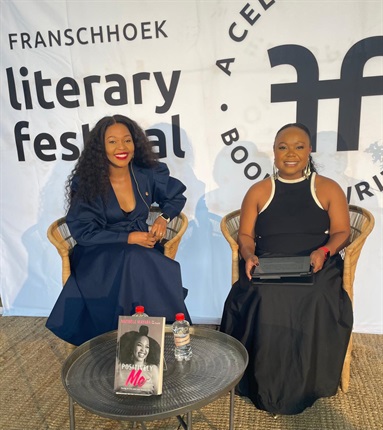
19 May 12:34
In the talk's conclusion, an audience member asks another question about transformation.
"Because of our diversity it's impossible to please everybody," Malotana says. He believes that when SA citizens can stand as a collective in unity, then true transformation takes place.
- Joel Ontong
19 May 12:22
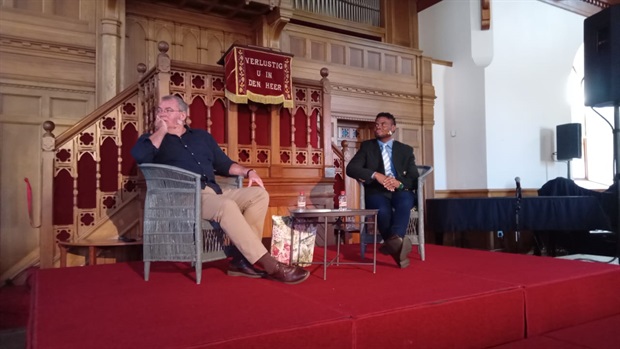
19 May 12:19
Erasmus didn't expect or take into account the reaction to the selection since Kolisi would be the Springboks' first black captain."I just chose Siya because I know him," Erasmus had said.
- Joel Ontong
19 May 12:16
- Joel Ontong
19 May 12:09
- Joel Ontong
19 May 12:05
"Rassie was one of those people who could see two or three situations ahead in a game," Malotana says. He also talks about how Erasmus was doing player analysis on computers before it became a proper profession.
- Joel Ontong
19 May 11:57
- Joel Ontong
19 May 11:52
- Joel Ontong
19 May 11:50
- Joel Ontong
19 May 11:47
Malotana reflects on his high school days at Queen's College. He had high optimism about his rugby career, but he faced a harsher reality.
"All the Black okes couldn't believe a Black player could play first team," he says.The quota system was a culture shock for Black players at the time.He felt that teams could have been stronger if there were more black players on the field, but there was always a balance that needed to be kept.
- Joel Ontong
19 May 11:41
- Joel Ontong
19 May 11:39
- Joel Ontong
19 May 11:36
THE BOK REVOLUTION SESSION:
David O'Sullivan chats with Kaya Malotana about transformation rugby and Rassie Erasmus. Malotana arrives with his 1999 Springbok jersey. O'Sullivan praises Malotana for his impact during the opening remarks of the talk.
- Joel Ontong
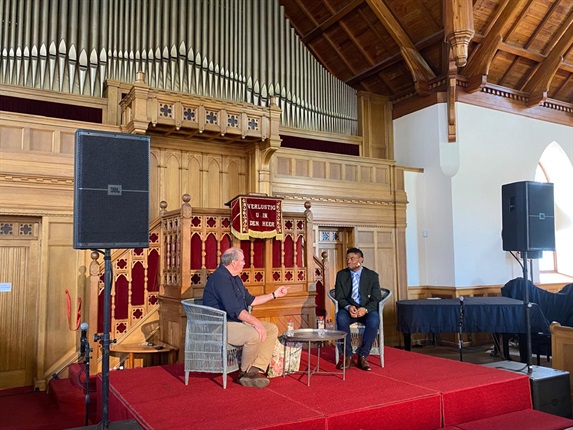
19 May 11:15
SESSION: PRESCRIPTION: ICE CREAM
This is McAlpine's first event, he said it's much more daunting sitting on the stage than in the audience. Working at Baragwanath was an extraordinary experience. When he worked there, they had 3000 beds, and on average, they admitted 160 patients at night.
“Working at Baragwanath could feel like the Wild West, and sometimes we felt like soldiers going through a war. Medicine at the moment is failing - patients and medical staff alike.”
What he liked about working there is that you could make such a big difference.
"Treating the patients gives you the opportunity to do good work," he said.McAlpine said medicine is not a job that you log off at 17:00, doctors take their patients home with them and it contributes to most of the mental health problems doctors have. "We carry the patients with us especially the ones who had bad outcomes, you carry some guilt that you could have done something different," he said.
McAlpine said that the SA healthcare system doesn’t allow a doctor to be all the can be. When asked about the NHI he said he doesn’t know what the ultimate model should be, but the current system is not working, the system is not sustainable, and change is required but doesn’t think the current government can be trusted to implement it.
On the new National Health Insurance: “denying people health care because they can’t pay is wrong, but I don’t trust the current government to be the arbiters of the nation’s health.”
McAlpine said writing the book made him angry that his career had taken so much of him. He thinks that sometimes, too much is asked of doctors, particularly junior doctors. We have a system that is not meeting the needs of physicians, patients, and the health of a nation.
McApline then read the viral thread of the nuggets of wisdom that his young palliative care patients shared with him. Many of the audience members wiped tears as they listened to the words of children who knew they were dying. Of viral fame, McAlpine said it was a weird experience, but he also realised how fleeting fame can be. Nothing is more important than friends, family, ice cream, dogs, and smoosh them all together, he said.
In his book, McAlpine also speaks about his addiction. He admits that he initially didn’t want to put it in the book. He said it is a big problem in medicine as people don’t want to talk about issues like this because it can tarnish your record. On being in rehab: “Doctors have higher suicide rates than most of the population and there’s a lot of addiction among doctors that we just don’t talk about.”
"The tragedy is that it is killing us, doctors have high suicide rates, it's a huge problem and no on talks about it," said McAlpine. He added it to the book to show that there is a way out, recovery is possible. He had to humble himself and accept that he couldn’t help himself. The experience made him a more empathetic and caring physician.
McApline has been in Canada for five years and misses being in South Africa every day.
The session ended with an audience member asking what the children dying thought would happen to them. He said for them it was just the next step they were more worried about their parents that would be left behind.
- Leandra Engelbrecht and Charlotte Bauer
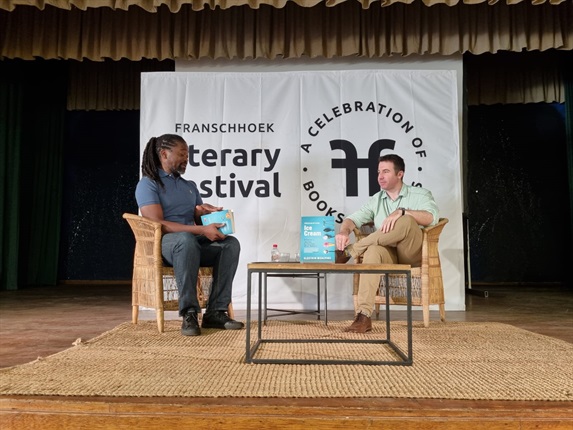
19 May 10:12
PRESCRIPTION: ICE CREAM: Africa Melane speaks to Alastair McAlpine about Prescription: Ice Cream – A Doctor’s Journey to Discover What Matters, which explores the peaks and troughs of a career in palliative paediatrics.
THE BOK REVOLUTION: David O'Sullivan, co-author of Rassie Erasmus' biography, Rassie: Stories of Life and Rugby, in conversation with his old friend Kaya Malotana, the first African Springbok.
THE LIES OF THE LAND: A literally unbelievable romp through South African history with Jonathan Ancer, author of Bullsh!t: 50 Fibs That Made South Africa. Ancer will be in conversation with News24's Pieter du Toit and cartoonist Carlos Amato, who drew the illustrations.
FIGHTING WORDS: Fiction is used to shape culture and shift history. Does it still? Is digital humanity now semiliterate, unable to read long texts or tackle complex ideas?
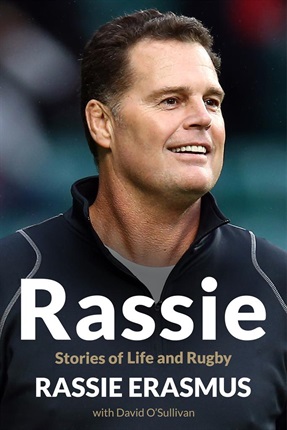
18 May 18:40
PRESCRIPTION: ICE CREAM: Africa Melane speaks to Alastair McAlpine about Prescription: Ice Cream – A Doctor’s Journey to Discover What Matters, which explores the peaks and troughs of a career in palliative paediatrics.
THE BOK REVOLUTION: David O'Sullivan, co-author of Rassie Erasmus' biography, Rassie: Stories of Life and Rugby, in conversation with his old friend Kaya Malotana, the first African Springbok.
THE LIES OF THE LAND: A literally unbelievable romp through South African history with Jonathan Ancer, author of Bullsh!t: 50 Fibs That Made South Africa. Ancer will be in conversation with News24's Pieter du Toit and cartoonist Carlos Amato, who drew the illustrations.
FIGHTING WORDS: Fiction is used to shape culture and shift history. Does it still? Is digital humanity now semiliterate, unable to read long texts or tackle complex ideas?
18 May 17:08
FLAWED FORCES SESSION:
CapeTalk host John Maytham chairs a panel on leadership with former Public Protector Thuli Madonsela, academic Adekeye Adebajo, and authors Nick Dall and Matthew Blackman. Thuli Madonsela says three traits make good leaders: vision (not one person but a team); character (leaders who are prepared to say what is right and wrong), and the ability to activate "followership", citing Nelson Mandela's style of taking people with him while giving up power ("not everyone can be king or queen bee").
Adebajo warns against looking for "saints" or "deifying leaders, whether they are Mandela or Thuli". Madonsela agrees and adds, "I am yet to see a leader like Mandela who could lead in complexity".
The term "benevolent dictator" is an oxymoron. Germany thought Hitler was one. Italy thought Mussolini was one. Paul Kagame of Rwanda is killing journalists and hunting down political opponents in other countries, including South Africa. I am worried that Kagame may be preparing the ground for another genocide. There is nothing "benevolent" about a dictator. Maytham asks panellists if any leader on the SA ballot on 29 May inspires them.
Madonsela says Ramaphosa is still the best leader we have, saying he can lead people who do not look like him. (She stays clear of endorsing the ANC). Maytham says he was "all into Thuma Mina", but he can no longer trust Ramaphosa.
Blackman warns the audience that the "leaders behind Ramaphosa are Mashatile and Mbalula". Adebajo says the DA "got their maths wrong… burning the flag, the national symbol, and starting something called a 'Moonshot pact' that sounds like a hodgepodge". He calls for a "sense of perspective" about what SA has achieved over the past 30 years. "I'm not campaigning for the ANC".
Madonsela praises WC premier Alan Winde as a leader "who can work with everyone" and understands the legacy of apartheid and the work that should still be done. Madonsela says, "Winde and Ramaphosa are leaders who are not lying to us". She says Jacob Zuma "just stole the MK Party, the MK brand".
Question from the audience about DA KZN premier candidate Chris Pappas.
Madonsela says she thinks he is excellent, but she is afraid that he would be swallowed "in the DA's black hole of insults and toxicity". Blackman says he rates Cape Town Mayor Geordin Hill-Lewis as a great, inclusive leader.
Madonsela says a “nightmare scenario” outcome of the election would be an ANC-EFF-MK coalition. “Because the first thing they would say is it can’t happen with Ramaphosa as party leader and he would be out.” She says she agrees on this point with John Steenhuisen. And that’s a wrap!
- Adriaan Basson
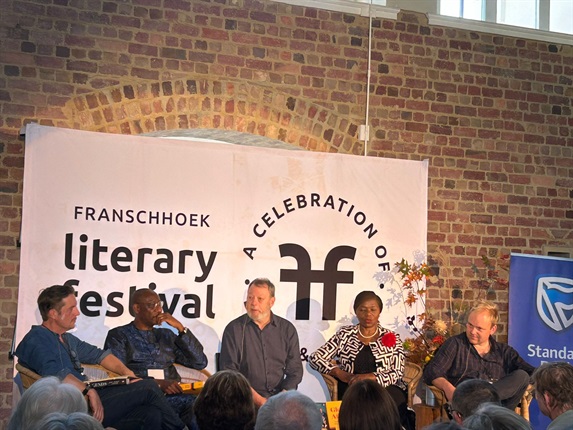
18 May 17:05
- Shaun de Waal
18 May 17:04
The Constitution has protected us from the worst, such as a media tribunal, says Le Roux.
- Shaun de Waal
18 May 17:03
- Shaun de Waal
18 May 17:00
- Shaun de Waal
18 May 16:55
- Shaun de Waal
18 May 16:54
- Shaun de Waal
18 May 16:47
- Shaun de Waal
18 May 16:43
The ANC speaks the language of empowerment, says Malala, but it's undercut by corruption and incompetence.
- Shaun de Waal
18 May 16:42
- Shaun de Waal
18 May 16:38
I'm a great fan of the constitution, says Malala. But government has failed. Young people don't see a future for themselves, and they blame the constitution. The Premier of Gauteng says "we'll give you a job", but that's not government's duty. When government fails, the constitution is blamed.
- Shaun de Waal
18 May 16:30
State capture in the Zuma years kept the Chapter 9 institutions but hollowed them out, says Le Roux.
- Shaun de Waal
18 May 16:28
Our courts are going to be busy after the election, says Le Roux. "The lawyers are all on standby." We have to see it as the vibrancy of our democracy.
- Shaun de Waal
18 May 16:23
The potential in law is enormous, says Le Roux. We need a capable state that can realise the potential of the constitution. The TAC, for instance, was in the streets and they were also in court. Voting counts, but we can't have a stake in the future of SA only every five years. That's not enough.
- Shaun de Waal
18 May 16:18
There are hundreds of service delivery protests every day, says Le Roux, but it doesn't move the dial.
- Shaun de Waal
18 May 16:17
- Shaun de Waal
18 May 16:13
Williams asks: "How much are we using our agency as citizens?"
- Shaun de Waal
18 May 16:07
The Citizen Can session begins. Michelle le Roux is asked by Bronwyn Williams about her book with Dennis Davis, Lawfare. It's about the "turn to courts" to solve political problems. If politics fails, we shouldn't ask too much of the courts.
- Shaun de Waal
18 May 15:53
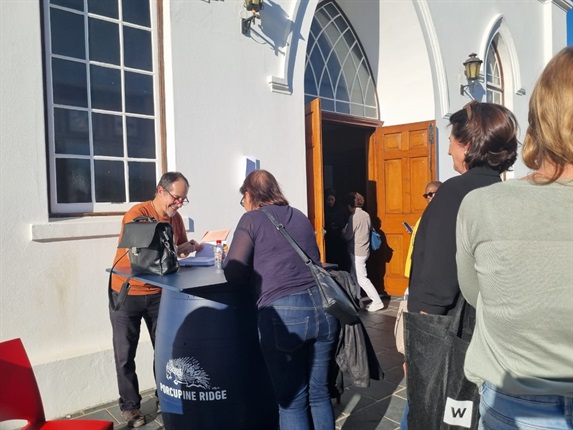
18 May 15:42
What can ordinary South Africans do to protect our future and our democracy? Bronwyn Williams (Rescuing Our Republic) swaps ideas with Justice Malala (The Plot to Save South Africa) and Michelle Le Roux SC (Lawfare: Judging Politics in South Africa).
18 May 15:40
THE DAVID WALLIAMS SHOW 2: A supercharged, one-hour spectacular with one of Britain’s favourite storytellers.
RED INK ON SCREEN: Author Angela Makholwa and actress Nqobile Nunu Khumalo talk to Mohale Mashigo about Showmax's TV adaptation of Red Ink, Makholwa’s hit thriller about a writer’s entanglement with a serial killer.
QUEERTOPIA: What are the new, emerging visions in LGBTQI+ literature? Letlhogonolo Mokgoroane reads the signs with S.J. Naudé, Wisani Mushwana, and Troy Onyango.
FLAWED FORCES: John Maytham weighs the complex legacies of Africa’s changemakers – past and present – with former Public Protector Thuli Madonsela, Adekeye Adebajo, and Nick Dall and Matthew Blackman.
18 May 15:38
NO (EASY) WAY OUT SESSION:
Julian Cobbing says we are "a cancerous species… we grow and grow and grow". Capitalism is built on the premise that it must continuously grow. Individuals can be as sparingly as possible, but industries must change.
Adam Welz sees "all the indicators going in the wrong direction". Consumption patterns need to change even more. Welz says the financial system of continuous growth must change; buying a green product in a shop will not move the needle much.
Welz: Don’t waste time deciding if this or that product is better in a supermarket; the supermarket is the problem. He sees "a few glimmers of possibility." Welz doesn't like the term "climate change… I prefer climate breakdown." He says "climate" and "change" are opposites, and our brains reject such phrases. "Breakdown" acknowledges that an ecosystem is being broken down.
Welz: we need to prepare for a world in which weird stuff will start happening. He advised people to start building resilient, robust communities; to move away from a culture of individualism. Product designers can change the world; moving away from this level of consumerism.
Welz criticises banks for pretending to be green, but they continue to invest in fossil fuels. Welz urges the audience to stop “under-growing” their gardens and rather stimulate overgrowing for species to thrive. He harshly criticises the current way gardens are kept; lawns are mowed, contributing to emissions.
Welz has some very honest and practical advice for people who want to change: drive the smallest car you can, and don’t eat beef. As simple as that. "That's a good start". We are on a "road to hell" with large potholes ahead.
- Adriaan Basson
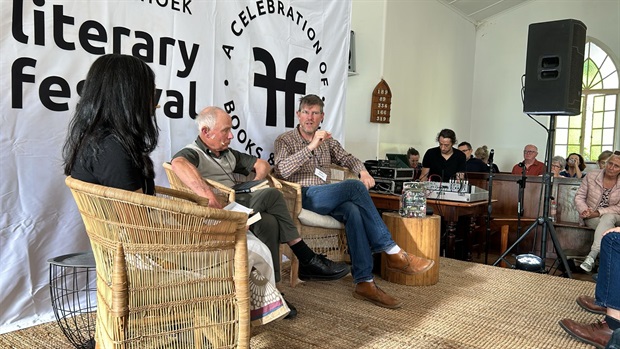
18 May 15:33
Zapiro and Amato conclude their session by talking about their work ethic and the pressures of producing creative content on a tight deadline and high volume.
- Joel Ontong
18 May 15:31
Zapiro and Amato are asked about satirising tragic moments."I try to see it as a therapy," Amato says, adding that it's difficult to create cartoons about painful topics.
Zapiro says that personally working through these painful topics is key.
"The first few days of the George [building collapse], I couldn't think of what to do," Zapiro says. But eventually, he finds empathetic ways of dealing with issues, without punching down.
- Joel Ontong
18 May 15:24
Zaprio touches on "wokeism" after an audience member asks him about it.
He says it has had an impact on his work. He recognises he is politically uncorrect, but tries to be understanding and open to new and alternative perspectives.
With his new cartoons, he tries to be aware of the reaction his work might get and how a possible backlash could distract from his message, instead of bringing actual attention to it.
He once had a conversation with Helen Zille about how he has become more aware of the reaction to his work.
"They got to you," Zille apparently told Zapiro.
The cartoonist has received death threats for his past work.
"I was physically attacked on the [World Cup] fan walk," he shares.
- Joel Ontong




 Publications
Publications
 Partners
Partners




